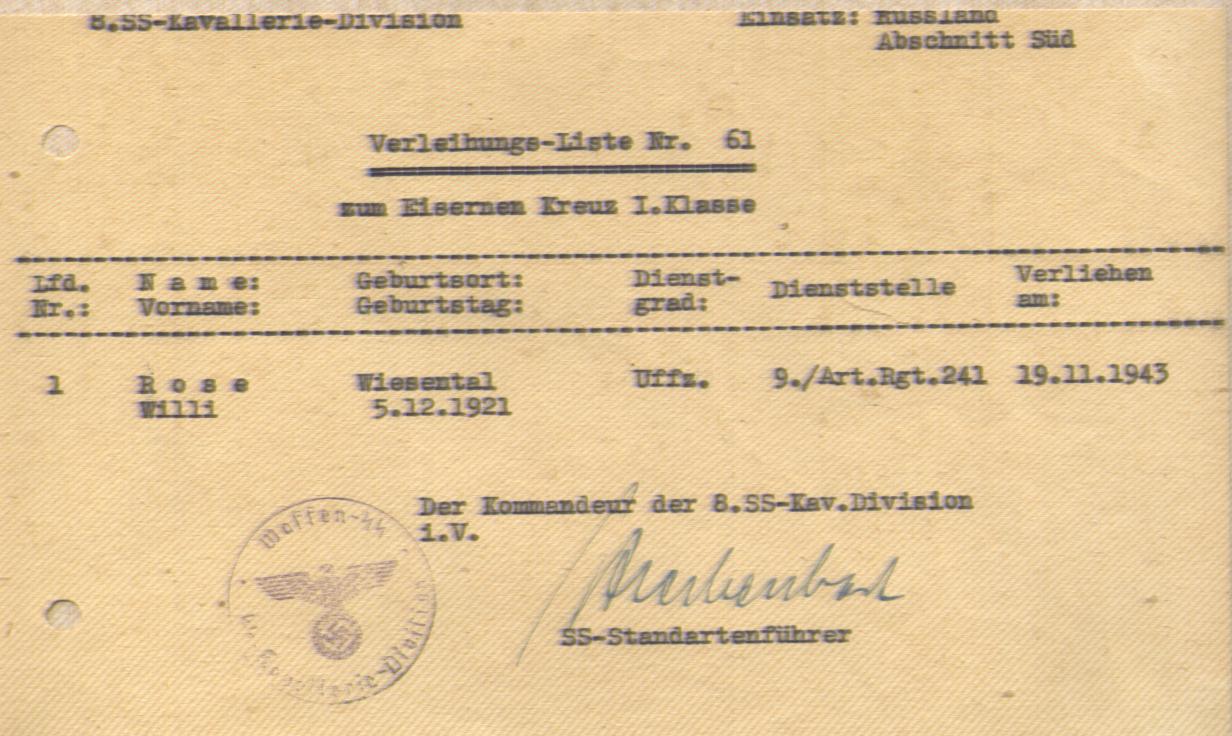
|
~SOLD~STRECKENBACH Bruno
STRECKENBACH Bruno
*07.02.1902 Hamburg
+28.10.1977 Hamburg
Awarded Knights Cross: 27.08.1944
As: SS-Brig.Fhr.u.Gen.Maj.d.W-SS d.R,Kdr.19.W-Gren.Div.d.SS ( let,Nr.2)
Oakleaves: as the 701st Recipient SS-Brig.Fhr.u.Gen.Maj.d.W-SS d.R,Kdr.19.W-Gren.Div.d.SS ( let,Nr.2)
Bruno Streckenbach was born in Hamburg, Germany on 7 February 1902. His highest education was Gymnasium, which he left in April 1918 to voluntarily report to the German army during WWI. Just like his close colleagues Erwin Schulz and Heinrich Himmler, he never served on the front lines of the battlefield due to the ceasefire that took place in November 1918.
After the first World War, he was an active member of the Freikorps Bahrenfeld, which took part in the 1920 Kapp-Putsch. He was employed as a wholesale merchant, tried his hand at advertising, being a radio editor and also trying to establish himself as the director of a local office.
He was the head of Administration and Personnel Department of the Reich Main Security Office. Streckenbach was responsible for many thousands of murders committed by Nazi mobile killing squads known as Einsatzgruppen.
Streckenbach was not commissioned for the position of Head of the RSHA, and Ernst Kaltenbrunner was chosen instead.
Streckenbach was to be named the Senior SS and Police Leader of the Alpenland in Salzburg, Austria. Extremely disappointed, nonetheless, Streckenbach declined and in a personal letter to Himmler, requested to be placed in a military position
Streckenbach trained in Hilversum, Holland with an antitank unit (as an Untersturmführer) in the beginning of 1943, and quickly advanced through the ranks of the military, even for being a senior SS leader. He was a regiment and division leader of the 8th SS Cavalry Division Florian Geyer and went on to lead the 19th Waffen Grenadier Division of the SS (2nd Latvian) in the offensive against the Soviet Union in 1944 as a general of the Waffen-SS.
On 10 May 1945, Streckenbach and his division were captured and taken prisoner by the Soviet army.
He remained a Soviet prisoner of war until 9 October 1955, when he was sent back to Hamburg
During the Nuremberg Trials, Streckenbach’s name was continuously mentioned, including a telling testimony from Otto Ohlendorf who, as mentioned before, identified Streckenbach as he who had directed the Einsatzgruppen towards implementation of the Final Solution. However, the Hamburg State Prosecutor’s Office concluded that there was not sufficient evidence to prove that his actions conflicted with the then-governing laws of the National Socialist rule.
This was the case with many inhumane acts taken by the former Nazi members; as Wildt says, the assumption that National Socialism was synonymous with the “German Dictatorship rendered indivisible” the murderous acts that the party had taken in eastern and southern Europe and the Soviet Union.
In 1957, state prosecutors in Germany began discovering the unfathomable atrocities and millions of deaths of Soviet Jews which led to the Ulm Einsatzkommando trial, and the 1959 establishment of the Central Office of State Justice Administration for the Investigation of National Socialist Crimes (Zentrale Stelle der Landesjustizverwaltungen zur Aufklärung der nationalsozialistischen Gewaltverbrechen) in Ludwigsburg.
In the early 1960s, this office discovered a document which proved Streckenbach’s deployment orders to Criminal Police and Gestapo officers, which incited murderous activity. The led to the resumption in the investigation of Nazi crimes committed by Bruno Streckenbach.
On 30 June 1973, the bill of indictment claiming the murder of at least a million people was accused upon Bruno Streckenbach. However, Streckenbach was suffering from serious heart disease at the time and claimed ineligibility of withstanding the trial based on health concerns. On 20 September 1974, the Hanseatic Appellate Court confirmed this and definitively rejected the trail’s commencement. Bruno Streckenbach never had to answer for his atrocities committed as a part of the Nazi regime.
Bruno Streckenbach died on 28 October 1977 in Hamburg, Germany
Signed Verliehungsliste. Rare autograph seldom seen
Price: $350.00
Please contact us before ordering to confirm availability and shipping costs.
Buy now with your credit card
other ways to buy
|


